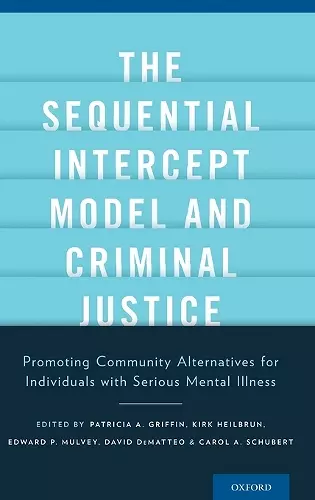The Sequential Intercept Model and Criminal Justice
Promoting Community Alternatives for Individuals with Serious Mental Illness
David DeMatteo editor Kirk Heilbrun editor Patricia Griffin editor Edward Mulvey editor Carol Schubert editor
Format:Hardback
Publisher:Oxford University Press Inc
Published:9th Apr '15
Currently unavailable, and unfortunately no date known when it will be back

The number of individuals with severe mental illness in the criminal justice system is shockingly high. However, there is a wealth of research that shows that the traditional incarceration model is not effective with this population, and that many of these individuals can be helped in the community at less cost without increased risk to public safety by addressing their risk-relevant needs and improvinge their opportunities for recovery. As a result, during the last decade there has been an increasing interest in community-based alternatives to incarceration for individuals with severe mental illness. The Sequential Intercept Model and Criminal Justice offers an overview of the recent changes in correctional policy and practice that reflect an increased focus on community-based alternatives for offenders. Developed by Drs. Mark Munetz and Patricia Griffin, the Sequential Intercept Model (SIM) identifies five conceptual points at which standard criminal processing can be interrupted to offer community-based alternatives: (1) law enforcement/emergency services; (2) initial detention/initial court hearings; (3) jails/courts; (4) re-entry; and (5) community corrections/support. This volume describes the SIM in detail and reviews empirical evidence for each of its five points of interception. Chapters focus on its implementation, starting with an analysis of the national and state-level initiatives, then addressing specific challenges. A final section suggests how the SIM might be applied successfully to other populations (e.g., those with developmental disabilities). This volume will appeal to policy makers who are considering community-based alternatives, practitioners who carry out these changes, and program evaluators who seek to document the impact of such changes.
In The Sequential Intercept Model and Criminal Justice, Patricia Griffin and her co-editors have somehow managed to get a Who's Who of contributors to flesh out the nuanced implications of this generation's most important conceptual contribution to community-based services for justice-involved people with mental illness. The book seamlessly weaves together up-to-the-minute academic research and down-to-earth clinical practice. It provides nothing less than a pellucid roadmap for transforming the highly contested terrain where the criminal justice and mental health systems meet and often clash. * John Monahan, Ph.D., John S. Shannon Distinguished Professor of Law, and Professor of Psychology, Psychiatry, and Neurobehavioral Sciences, University of Virginia *
There is widespread agreement among police and mental health agencies that the criminal justice system is a less-than-ideal way to serve the needs of people with serious mental illness and their communities. Instead of hand-wringing over the 'criminalization of mental illness,' Patricia Griffin and her colleagues have provided communities with a practical strategy for doing something about it. The Sequential Intercept Model is proving itself to be the very best kind of public policy, simultaneously appealing to public safety, cost-effectiveness, and more humane treatment for people with serious mental illness. Thanks to a stellar roster of editors and chapter authors, we now have a practical guide to providing better, more humane treatment at much lower cost. * Joel A. Dvoskin, PhD, ABPP, Assistant Professor of Psychiatry, University of Arizona College of Medicine, and Chair, Nevada Governor's Advisory Council on Behavioral Health and Wellness *
ISBN: 9780199826759
Dimensions: 236mm x 160mm x 31mm
Weight: 540g
320 pages